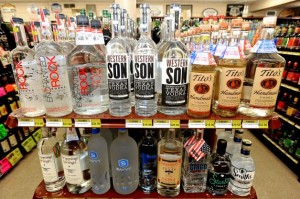Note: This story originally appeared in The Quorum Report. Join us there daily for coverage of Texas politics and government.
SAN ANTONIO – A fight in federal court is quietly playing out between liquor store operators based in Texas and those that are headquartered elsewhere but would like to gain a greater foothold in the Lone Star State. As with many intra-industry skirmishes, the framing of the conversation depends on who you’re talking to at that moment.
The Texas Package Stores Association last month filed a motion in federal court that their leadership says is intended to seek clarity about residency rules as they apply to who can own stores here and who cannot. The filing comes as some out-of-state chains start to make inroads in Texas markets like Dallas/Fort Worth and here in The Alamo City, but the association says the reason they’re asking a judge to weigh in is because of conflicting court opinions.
Years ago, the Fifth Circuit Court of Appeals – which oversees Texas – held that the state’s laws on residency in regard to liquor store ownership don’t hold up. But, the Eighth Circuit Court of Appeals last year upheld a residency requirement in Missouri.
The Package Stores court filing says in part that state law now “provides that a permit or license for the sale of alcoholic beverages may not be issued to a person who was not a citizen of Texas for a one-year period preceding the filing of that person’s permit or license application.” It goes on to say that “no person who has not been a citizen of Texas for a period of one year prior to the filing of his application shall be eligible to receive a permit under the Code, and further provides that no permit shall be issued to a business entity unless at least 51% of its equity is owned at all times by citizens who have resided in the state for at least one year.”
The association’s Executive Director Lance Lively said “we’ve got one court going one way and the other court going the other way. We need to figure out who’s right.”
Lively, whose group represents retailers like Spec’s and Twin Liquors, said that the Texas Alcoholic Beverage Commission has essentially ignored the residency laws because of the old court order from the Fifth Circuit. But the law is still on the books, Lively pointed out. “We just want to know going forward who we are supposed to listen to,” Lively said.
Carolyn Beck at the TABC said the agency is not a party to the lawsuit there would be no comment from them. “We will be watching to see how things develop,” Beck said.
Lively said the residency laws are easily defensible in the case of alcoholic beverage sales because it is a controlled substance. “If you’re selling tube socks, that’s one thing,” he said. “We sell products that are highly regulated for a good reason. We want to be responsible actors,” Lively said. “The people who own these stores are our neighbors. Their kids are on the little league team. They’re part of the fabric of our society.”
A Maryland-based retailer firmly believes this legal action is a direct shot at them as they seek to expand in Texas.
Vice President of Total Wine and More Edward Cooper is in San Antonio this week for the National Conference of State Liquor Administrators and said he has no doubt his firm is in the crosshairs of companies that don’t want new players in markets across Texas. “It is directed at us and it is code words for ‘we don’t want to compete’ with them,” Cooper said. He said the lawsuit is designed to “allow government to decide the winners and losers. That’s not right.”
Total Wine has less than 10 stores in Texas now and sees the potential to expand to as many as about 35 or 40 stores.
Cooper found this lawsuit particularly ironic given that Gov. Perry and other officeholders here – but, primarily Perry – are consistently telling companies they need to come do business in Texas. “We took him at his word,” Cooper said. “This lawsuit doesn’t seem to square.”
Cooper rejected Lively’s argument that liquor store owners should live in the place where they operate. Those owner-operators do have a competitive advantage over companies like Total Wine in that they know people in the neighborhood and have that kind of relationship, Cooper said. “We find other ways to compete,” he said. “The customer wins when the free market is allowed to work.”
Lively took issue with the claim that his group’s lawsuit is directed at Cooper’s firm.
“Not true at all,” Lively said. “This is not about Total Wine and More and I’m not going to make it about that. This is simply about the laws that are on the books. We’ve got competing courts and we need to figure this out,” he said.
As is often the case when dealing with the federal courts, there is no indication of when a ruling might be issued.
Copyright June 17, 2014, Harvey Kronberg, www.quorumreport.com, All rights are reserved. Reprinted with permission.


